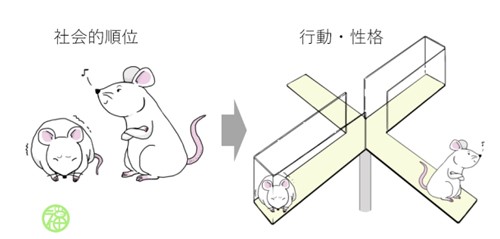News
National Institute of Genetics and University of Shizuoka Find Social Rank Can Influence Mouse's Depressive Behavior Updated in September 2017
When a mouse's social rank among a group is low, it acted very much like depressed humans. A joint research by National Institute of Genetics (NIG) and University of Shizuoka announced. The research group also clarified that social ranks affect gene expression in the brain attributed to depression-like behavior. These results are currently drawing attention. A paper on this subject has recently been published in the electronic version of Scientific Reports.
The research group consists of Researcher Yasuyuki Horii and Associate Professor Tsuyoshi Koide both from the National Institute of Genetics (NIG); Professor Kayoko Shimoi from University of Shizuoka Food and Nutrition Science Division and graduate student Tatsuhiro Nagasawa. By using a mouse with “social stress” like humans, the team examined the relationship between its social rank and depression-like behavior.
For 2 weeks, the team conducted an experiment in which a group of 4 male mice were placed in a cage. They chose mice with nearly the same weight and same number of days after birth. They carefully observed each mouse inside the cage by using infrared digital cameras. The experiments were repeated several times and a total of 40 cages were observed. As a result, dominant mice taking aggressive behaviors and submissive mice taking defensive actions started to appear over time in each cage. It turned out that social ranks were formed between the mice.
Next, the research group observed and investigated the differences in behavior due to social ranks. Specifically, the team investigated behavioral patterns seen in relatively wide open spaces and inside the aquarium. As a result, mice with low social ranks took actions that seemed depressive: short travel distance in the open space and prolonged inanimate time in the water. The research group believes that the behavioral differences were noticeable. The lower the social rank, the more deeply depressed behaviors were observed.
The research group further investigated the difference of serotonin in the mice's cerebral neurotransmitter, which is thought to be related to aggression, anxiety and depressive symptoms. Consequently, gene expression of serotonin receptors was greatly affected in lower ranking mice. Based on this result, when the research group administered anti-depressants ("selective serotonin reuptake inhibitor" used for treatment of human depression) to the suffering mouse, the influence on gene expression was greatly alleviated.
According to the research group and other sources, the lifetime prevalence of depression in Japan is as high as 3% to 7% and stress in the living environment can trigger depression. According to the research group, results from this experimental will be useful to establish ways to cope with depression and ways to treat depression.








